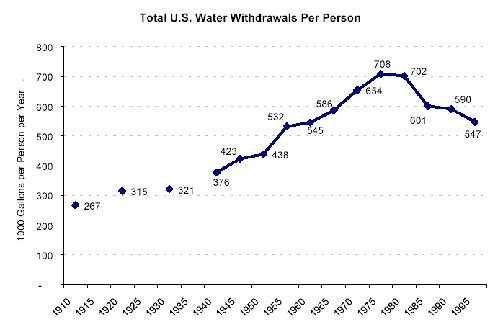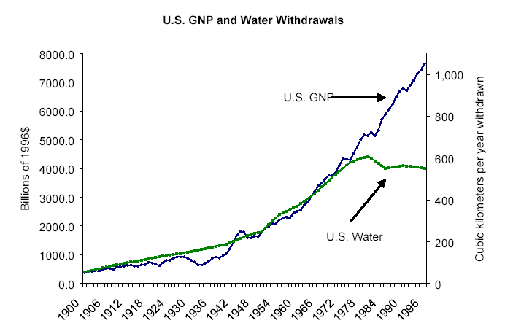|
Hearing: On the Need for a National Water Commission
for the 21st Century
Testimony of Dr. Peter H. Gleick
Before the Legislative Hearing of the Subcommittee on Water and Power
Of the Committee on Resources
United States Congress
April 1, 2003
Mr. Chairman, Representatives: thank you for inviting me to offer comments
on the need for a National Water Commission for the 21st Century. I
believe there is indeed need for such a Commission, and on March 10,
2003, the Pacific Institute called for its creation in a letter to the
President and members of Congress. I have attached for the record a
copy of that letter.
The United States has not had a national water commission in place
for 30 years, since the 1968 National Water Commission reported to the
President and Congress in 1973. Moreover, we have never had a national
water commission with the authority and responsibility to review and
recommend on the role of the U.S. in addressing international water
issues. My comments today will address the idea of a Commission generally,
with some detailed recommendations. I will also provide specific comments
on H.R. 135, a bill proposed to establish such a Commission. In short,
the idea of such a Commission is an excellent one; but I believe the
Findings and Duties as described in H.R. 135 need clarification and
revision if the Commission is to adequately deal with the water challenges
facing us.
International and Domestic Water Challenges
As we enter the 21st century, pressures on United States and international
water resources are growing and conflicts among water users are worsening.
International attention to these problems is growing, as shown by the
focus on water at the Johannesburg Earth Summit and the Kyoto Third
World Water Forum. Moreover, 2003 has been declared the International
Year of Freshwater by the United Nations.
Globally, the realization is growing that the failure to meet basic
human and environmental needs for water is the greatest development
disaster of the 20th century. Millions of people, mostly young children,
die annually from preventable water-related diseases.
Climate change is increasingly threatening our own water systems and
water resources abroad. Controversy is developing over the proper role
of expensive dams and infrastructure, private corporations, and local
communities in managing water. Yet the United States has not offered
adequate leadership in providing resources, education, and our vast
technological and financial experience to address these problems.
Here at home, municipalities are faced with billions of dollars of
infrastructure needs and growing disputes over the role of public and
private water management. Arguments among western states over allocations
of shared rivers are rising, as are tensions between cities and farmers
over water rights. The U.S. and Mexico have unresolved disagreements
over the Colorado and Rio Grande/Rio Bravo rivers, and our Canadian
neighbors are concerned about proposals to divert Great Lakes or Canadian
water for U.S. use. Communities are facing new challenges in meeting
water quality standards and ensuring that safe drinking water is available
for all.
Responding to Water Challenges: A New Water
Commission
In many cases, the resolution of these problems requires smart state
and local action. But national policies and actions are also needed,
as is leadership at the national level. Unfortunately, there is inadequate
attention being given to national water issues, and what efforts are
being made are often contradictory or counterproductive. Responsibility
for water is spread out over many federal agencies and departments,
operating with no overall coordination.
It is time for a new national water commission. The Pacific Institute
has called for the creation of a National Commission on Water for the
21st Century to provide guidance and direction on the appropriate role
of the United States in addressing national and international water
issues. The Commission must be non-partisan and include representation
from across the many disciplines affected, including the sciences, economics,
public policy, law, governments, public interest groups, and appropriate
private sectors. While the duration of the Commission should be fixed,
adequate financial resources should be provided to permit it to do a
serious and effective job. The goals of the Commission should include:
· Re-evaluate national water science and policy and offer guidance
on integrating efforts now scattered among disparate and uncoordinated
federal agencies and departments. National budget priorities should
also be re-evaluated and re-structured to ensure that the national objectives
are more clearly supported.
· Recommend revisions or better enforcement of national laws
related to water, including laws governing water quality, the protection
of aquatic ecosystems, the financing of water infrastructure, and national
standards for improving water-use efficiency and conservation.
· Develop recommendations for flood and drought management,
including implementing overdue changes proposed by previous reviews.
· Work to ensure the physical security of the nation's water,
by highlighting necessary steps that could be taken to reduce overlap
and streamline responsibilities of the multiple federal agencies working
on water issues.
· Develop recommendations for the U.S. role in identifying and
addressing global water problems, including how to significantly accelerate
efforts to meet the large and devastating unmet basic human needs for
water in poorer countries. These recommendations should address how
best to apply the vast financial, educational, technological, and institutional
expertise of the United States to these problems.
· Explore how to deal with the risks of climatic changes, including
how to adapt to the growing and potentially severe impacts of global
warming for water resources.
· Make recommendations for reducing the risks of international
tensions over shared water resources, including how to resolve concerns
with our own neighbors, Mexico and Canada, over shared water systems.
These recommendations would be valuable in other international river
basins where our experience, international stature, and expertise can
be effective.
The Need for U.S Leadership
It is past time for an integrated and comprehensive national water strategy
and for a stronger effort by this nation in solving water problems abroad.
While many water issues will remain local, to be resolved by community
participation and efforts, our national government can no longer ignore
the positive and effective role it can play both here and abroad.
The need for such integrated thinking was further made apparent at
the global water conference in Kyoto, Japan, which ended just one week
ago. The meeting involved 10,000 of the world's leading water experts
as well as a Ministerial meeting involving senior diplomatic officials
from more than 150 countries. It offered an opportunity to demonstrate
the commitment of the international community, nations, and non-governmental
organizations to resolve serious water problems. The United States,
with its great technical, financial, and educational expertise, is perfectly
positioned to be a world leader in addressing water problems, yet the
U.S. delegation came without the comprehensive, integrated, and informed
positions necessary to play a leadership role. Indeed, the United States
is perceived to be a marginal player, making contributions well below
our capability and stature as a world leader. And while money is not
the only answer, the size of the U.S. financial contribution to meeting
basic water needs around the world is paltry - actually only one-quarter
the size of Japan's and even less than Germany's. Instead, world leadership
on these issues is being played by the Netherlands, Japanese, French,
British, Germans, and others.
It doesn't have to be this way. A more coordinated and considered set
of positions on the size and form of U.S. contributions to global water
problems, including financial, technological, and educational, could
be developed by the National Water Commission for the 21st Century.
Comments on H.R. 135 "Twenty-First Century Water Commission"
Finally, I'd like to offer specific comments on H.R. 135.
I commend Congressman Linder and his co-signers for proposing
this bill. As my preceding testimony should make obvious, I strongly
support the creation of a national commission. I believe, however,
that this bill, as written, will not meet the needs of the nation.
In particular, the "Findings" of this bill are somewhat
misdirected and the "Duties," while well-intentioned,
are too limited and occasionally inappropriate.
In particular, the Findings emphasize the need "to increase water
supplies in every region of the country." Overall water supply
is not a problem, with some regional exceptions. And even in these regions,
increasing supplies does not appear to be the most efficient, cost-effective,
and timely response. The greatest water problems facing the United States
are not shortages, but inefficient use, inappropriate water allocations,
water pollution, and ecological destruction. Indeed, water use in the
United States has decreased in the past 20 years, reducing pressure
on overall supply. On a per-person basis, this decrease is substantial,
as shown in Figure 1. Per-capita use in the U.S. has decreased 20 percent
since 1980 - a remarkable change. Figure 2 shows that total economic
growth in the U.S. has continued, even as overall water use has leveled
off and even declined. Moreover, where the problem is "shortage,"
the fastest, cheapest, and most environmentally acceptable solution
will not be an increase in "supply" but a reallocation of
existing uses and improvements in efficiency.
Most of the proposed "Duties" of the Commission are clear
and well designed. But others could be strengthened and refocused:
Duty (2) should not be "directed at increasing water supplies"
but "directed at improving water use and reliability."
Duty (3)(E) should not be aimed at "increasing water supply efficiently
while safeguarding the environment" but at "improving water-use
efficiency and reliability of water supplies while safeguarding the
environment."
Duty (3)(F) should not recommend "means of capturing excess water
and flood water" but should rather "means for managing floods
using appropriate structural and non-structural approaches." This
would be in line with recent federal recommendations on comprehensive
flood management.
Duty (3)(G) asks for recommendations on "financing options for
public works projects." While this would be useful, given growing
constraints on funding at the national and local levels, it should be
broadened to make recommendations on "financing options for comprehensive
water management projects."
Duty (3)(I) asks for recommendations on "other objectives related
to water supply." Again, this should be broadened to make recommendations
on "other objectives related to water management."
On a relatively minor point: I believe the number of Commissioners
should be larger than 7, as proposed in Section 5, paragraph (a). Given
the diverse nature of the nation's waters, and the complex set of issues
that must be addressed, broader representation is necessary.
Finally, I reiterate the need to expand the scope of the Commission
to address the role of the United States in solving international water
problems.
I congratulate you for considering this vital issue and for helping
to raise national attention on the need to re-evaluate and re-focus
efforts on sustainably managing our precious freshwater resources.
Thank you for your attention.
Dr. Peter H. Gleick
Figure 1. Per-capita water withdrawals in the United States, from 1900
to the present. Total use is now below 550,000 gallons per person per
year, down from over 700,000 in 1975. Data are from the U.S. Geological
Survey.

Figure 2. Total gross domestic product (GDP) of the United States and
total water withdrawals: 1900 to present. Note that total economic growth
has continued, but total water withdrawals (for all purposes) have leveled
off, and even declined since 1980. Graph reproduced from Gleick, 2000
"The World's Water"(Island Press, Washington, D.C.)

Download full Testimony (PDF)
National Water Commission page
|